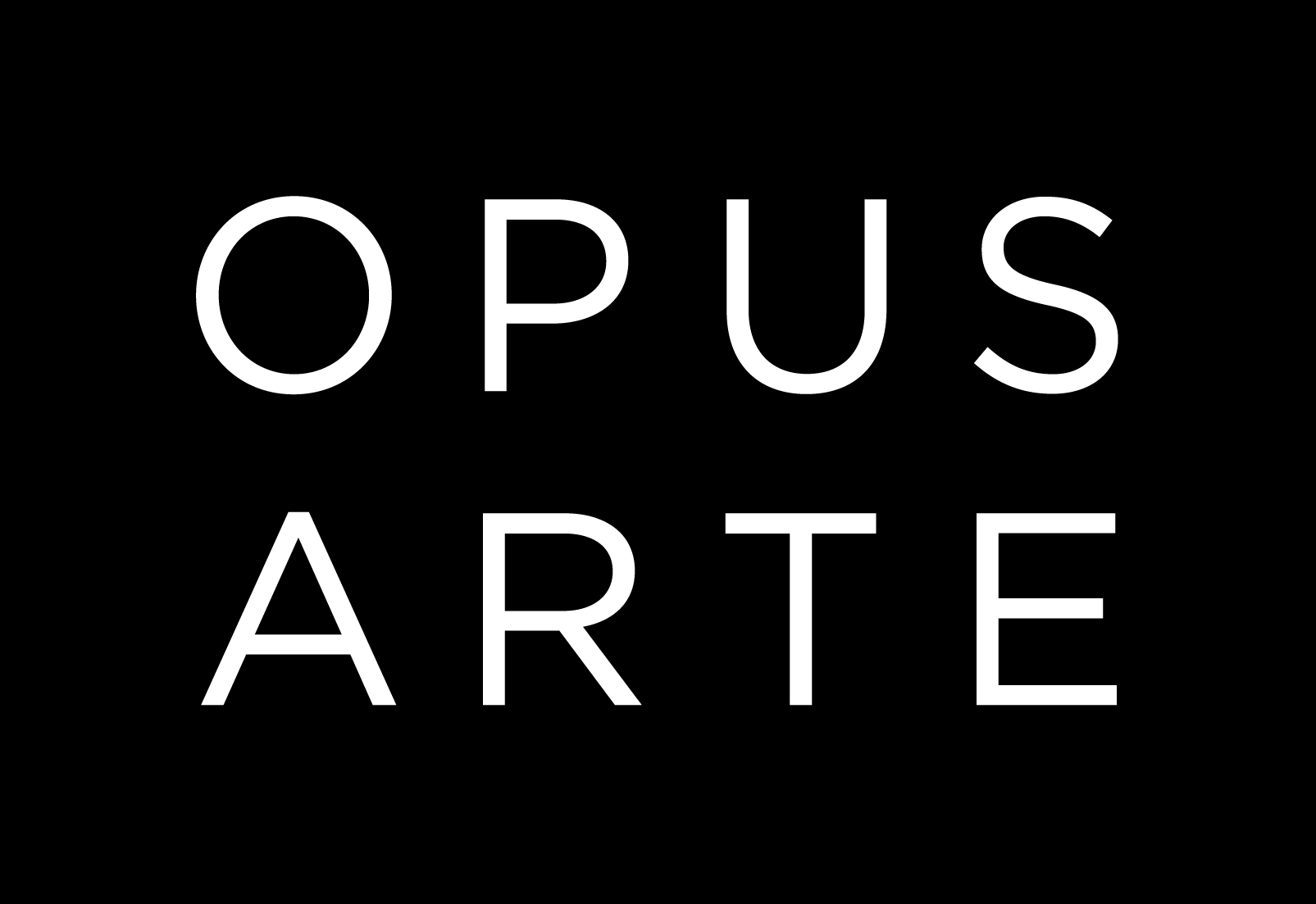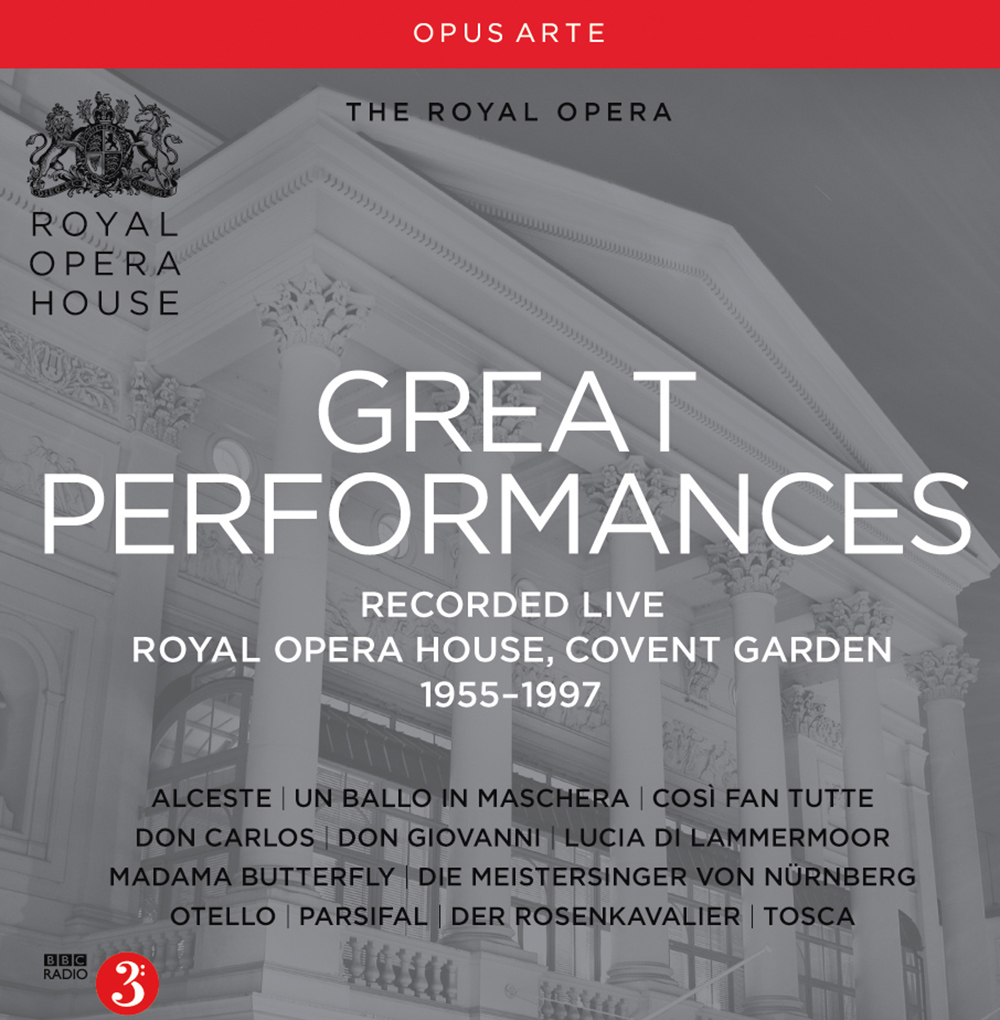Donizetti: Lucia di Lammermoor (1959)
Joan Sutherland (Lucia); Joao Gibin (Edgardo); John Shaw (Enrico); Joseph Rouleau (Raimondo); Kenneth Macdonald (Arturo); Margreta Elkins (Alisa); Robert Bowman (Normanno); The Covent Garden Opera Chorus & Orchestra; Tulio Serafin
"The Lucia di Lammermoor was taped in 1959 during the opening run of the epoch-making Franco Zeffirelli production that made Joan Sutherland a star overnight. No one had sung Lucia with quite such vocal amplitude or agility before, and you can feel yourself being swept away with the audience as their enthusiasm reaches fever pitch." (The Guardian ìììì)
"Rarely has the Royal Opera House seen quite so historic an occasion as the overnight emergence of Joan Sutherland as a superstar in February 1959. This live recording captures the thrill of the occasion vividly, with Sutherland not only fresh and bright throughout, but technically flawless, with crisp trills and coloratura and seamless legato. Not only that, her vocal acting is magnetic ...compelling listening, with Serafin wonderfully vigorous and supremely understanding of the Donizetti style" (The Penguin Guide)
Gluck: Alceste (1981)
Robert Tear (Admète); Janet Baker (Alceste); John Shirley-Quirk (Le Grand Prêtre / Un Dieu infernal); Maldwyn Davies (Evandre); Philip Gelling (Le Héraut / Le Dieu Apollon); Jonathan Summers (Le Dieu Hercule); Orchestra & Chorus of the Royal Opera House; Charles Mackerras
"In her last year on the operatic stage, Janet Baker sang the magnificent title role in Gluck’s Alceste, with the scholarly but ardent Charles Mackerras conducting. The result is electrifying, as Gluck well performed always is (as is still so rarely the case). Robert Tear is the husband for whom she is happy to die, and the British stalwarts who make up the rest of the cast show what a fine ensemble it was. Baker is, as always, dignified, grand, commanding, and expert at communicating a grief which you know she will overcome. This is a most fitting tribute to her particular gifts." (Classical-Music.com ìììì)
"Mackerras is one of several reasons why this recording is so magical. One can sense that the audience are on the edge of their seats, mesmerised at the evocative timbres Mackerras produces from the Covent Garden Orchestra. His pacing of the score is immaculate, blending a gravity that is appropriate to the classical theme of the piece with a magical sense of drama. There really isn't a boring moment in the whole thing; even the closing orchestral divertissement, which is often cut, captivates in this visceral reading.
Baker's performance in the title role is a wonderful example of her art, and one which hasn't previously been available on record. Although she still conjures up plenty of the pure tone for which she is renowned, for me it's the vitality of her delivery of Alceste's key moments that makes this such a compelling experience. This isn't, however, a one-horse race. As Admète, Robert Tear is Baker's equal in both dramatic inclination and vocal poise, while John Shirley-Quirk is also captured at his very best as Le Grand Prêtre/Un Dieu infernal. As always, Mackerras has an unerring ability to draw the best out of the orchestra, inclining on the fast side with speeds but never pushing the singers too hard. The string sound is noticeably lucid, while the woodwinds' contributions add spice to proceedings. Overall, the recording really is lovely and a joy from start to finish." (Musical Criticism ììììì)
Mozart: Cosí fan tutte (1981)
Kiri Te Kanawa (Fiordiligi); Agnes Baltsa (Dorabella); Daniela Mazzucato (Despina); Stuart Burrowes (Ferrando); Thomas Allen (Guglielmo); Richard Van Allen (Don Alfonso); The Orchestra of the Royal Opera House; Colin Davis
"The conducting of Colin Davis ensures that this is not just a polished performance but a memorable musical and theatrical experience." (The Evening Standard)
"It was a high-level cast; notable features were spontaneous, clear, fluent recitative, audible sotto-voce whisperings, and an electrifying unity in ensemble." (The Stage)
Mozart: Don Giovanni (1962)
Cesare Siepi (Don Giovanni); Geraint Evans (Leporello); Leyla Gencer (Donna Anna); Sena Jurinac (Donna Elvira); Mirella Freni (Zerlina); Richard Lewis (Don Ottavio); David Ward (Il Commendatore); Robert Savoie (Masetto); The Covent Garden Opera Chorus & Orchestra; Georg Solti
"Cesare Siepi’s Don Giovanni was a celebrated interpretation and one hears why immediately. The voice is warm, has an appropriate bass quality to the baritone sound and a wonderful sense of line. Being Italian his words are naturally sung, but also inflected, coloured and caressed with scrupulous care to meaning and drama. He captures the magnetism and nobility of the character well, and also his arrogance and danger.
The under-recorded Turkish soprano Leyla Gencer sings Donna Anna. She was another of the exciting singing actresses of her day, but was to some extent overshadowed by the parallel careers of others such as Callas. This distraught Donna Anna is quite something else. It is sung with a solid technique, sure dynamic control and with bags of temperament.
For anyone with an interest in the history of opera-performance this is an invaluable record of Mozart in the 1960s, and one that it hugely enjoyable to boot. Solti’s contribution is hard to assess here. To have got a performance of such power and variety must have taken more than just a sure hand. One rarely feels he is driving the performance relentlessly as he often did in his later recordings and performances, and how much better the result." (Classical-source.com)
"The wonderful, under-recorded Leyla Gencer, whose career as a bel cantist was overshadowed by Callas and whose reputation as a Verdian suffered in comparison with both Callas and Tebaldi, here proves that she also was a great Mozartean, singing Anna with fire, fluency, and gorgeous pianissimos. Sena Jurinac may not be quite as crazy as I prefer my Elviras, but she’s dramatically and musically superb and cuts a tragic, honest figure. Mirella Freni is everyone’s ideal as Zerlina.
Cesare Siepi was the world’s favorite Don in the ’50s and ’60s and it’s easy to tell why: the voice is alluring, its dark, velvety sound always seductive, and he enunciates the text–and the character–with grace, ease, and just the right hint of menace. Geraint Evans’ Leporello is very much his own man and always musical; he never mugs, but his portrayal is tangy. Robert Savoie’s Masetto is actually vibrant and David Ward’s Commendatore authoritative." (Classics Today)
Puccini: Madama Butterfly (1957)
Victoria de los Angeles (Madama Butterfly); John Lanigan (Pinkerton); Barbara Howitt (Suzuki); Geraint Evans (Sharpless); David Tree (Goro); Michael Langdon (Il Bonzo); Joyce Livingstone (Kate Pinkerton); The Covent Garden Opera Chorus & Orchestra; Rudolf Kempe
"Here Victoria de los Angeles is caught at her appreciable best in one of her signature roles in a performance dating from 1957, thus at a point midway between her two studio recordings of 1954 and 1959 ... She manages to chart the development of the character remarkably vividly from the timid 15-year-old girl to the tragic suicide of the ‘mature’ 18-year-old. Many sopranos manage similar lightness of touch in the earlier scenes but few manage to remind us that the Butterfly encountered in the second half of the piece is still a girl. De Los Angeles manages to keep the lightness and clarity of tone of a young woman throughout, even through the exertions of ‘Un bel di vedremo’ and the final scene, yet still bringing the despair and darkness into the vocal palette as needed. The pathos is all there but in no way overdone or over-sentimentalised." (Classical Source)
"Georg Solti claimed that before his arrival Covent Garden’s standards were provincial. Not so in this 1957 Madama Butterfly, which is conducted with a light touch by Rudolf Kempe in a way that is entirely at the service of the score. The orchestra does him proud. So does the cast, even if it’s not quite in the stellar league of Solti’s for Don Giovanni (see Opera Choice). John Lanigan would later become a leading character tenor, but his Pinkerton is always creditable despite his lack of a truly Italianate tone. The invaluable Geraint Evans provides a thought-through Sharpless. One may have expected Victoria de Los Angeles to be too slight for Butterfly’s biggest moments, but she rises to all its challenges with aplomb in an account that describes the nobility of the heroine to perfection. " (Classical-music.com)
"It’s splendid: Angeles is in gorgeous voice, as usual, with that trademark shimmer at the top and a welcome, unexpected darkness at the mid and bottom. She consistently exhibits a scrupulousness to detail and a refusal to exaggerate anything. Her reserve never comes across as cool or aristocratic; rather, she paints a portrait of Butterfly that is guileless and overwhelmingly sad. " (Classicstoday.com)
"Another instalment in a marvellous series recalls a special night when Victoria de los Angeles sang a Butterfly for the ages. Her conductor, Rudolf Kempe, conducts a fleet, airy reading which bristles with energy and grows in power. And how lovely to hear the young Geraint Evans as Sharpless. " (Gramophone)
Puccini: Tosca (1957)
Zinka Milanov (Floria Tosca); Franco Corelli (Mario Cavaradossi); Gian Giacomo Guelfi (Il barone Scarpia); Michael Langdon (Cesare Angelotti); David Tree (Spoletta); Forbes Robinson (Il sagrestano); Ronald Lewis (Sciarrone); Rhydderch Davies (Un carciere); The Covent Garden Opera Chorus & Orchestra; Alexander Gibson
"... with good, bright, mono sound the performances of Zinka Milanov and Franco Corelli are both commanding, Corelli making his debut at Covent Garden. Gian Giacomo Guelfi is impressive as Scarpia ... and Alexander Gibson demonstrates what a powerful opera conductor he was at this period." (The Penguin Guide)
Strauss: Der Rosenkavalier (1995)
Anna Tomowa-Sintow (The Marschallin); Kurt Moll (Baron Ochs); Ann Murray (Octavian); Barbara Bonney (Sophie); The Orchestra of the Royal Opera House; Andrew Davies
"Andrew Davis has firm control of the score, its textures iridescent, the momentum sustained with a grace and urgency exactly suited to the psychological turmoil afflicting the protagonists. Don’t miss the new cast at any cost." (Opera)
"The John Schlesinger production of Der Rosenkavalier may have been around for more than a decade, but it continues to ravish the eye." (The Times)
Verdi: Don Carlo (1958)
Boris Christoff (Filippo II); Jon Vickers (Don Carlo); Tito Gobbi (Rodrigo); Michael Langdon (Il Grande Inquisitore); Joseph Rouleau (Un frate); Gré Brouwenstijn (Elisabetta di Valois); Fedora Barbieri (La Principessa Eboli); Jeannette Sinclair (Tebaldo); The Covent Garden Opera Chorus & Orchestra; Carlo Maria Giulini
"The conductor accentuates the flowing nature of Verdi’s melodies in the support of his singers but without detriment to the drama of the opera. One of the first soloists to benefit from this approach is Jon Vickers as the emotionally tortured Carlo. In his interview Lord Harwood notes that Vickers was not the most Italianate of tenors. Yet throughout the performance Giulini draws from him the most sensitive singing and phrasing that I have ever heard from this fine artist who we tend only to remember as the outstanding Otello of his generation and as a Wagnerian.
The really great singing on this recording comes from the duo of Boris Christoff as King Philip and Tito Gobbi as Rodrigo repeating the roles they sang on the 1954 HMV recording. In a live performance, and with Giulini conducting, their singing is so much more dramatic." (Musicweb International)
"The opening of Luchino Visconti's production of Don Carlo at Covent Garden in 1958 was one of the landmark events in the post-war history of the Royal Opera House. It was the first time that the five-act version of the epic had been staged in Britain, and the musical and dramatic success of the production, established the work as one of Verdi's greatest achievements.
The set is worth hearing, not only as a memento of a great occasion, but for Carlo Maria Giulini's lovingly urgent conducting, Tito Gobbi's assured performance as Rodrigo, and for the young Jon Vickers as Carlos, singing with the impassioned fervour that made him one of the greatest operatic performers of the last 50 years." (The Guardian)
"Christoff was, with Nicolai Ghiaurov, the greatest of post-war Filippos. The voice is magnificent. In the great duet with Rodrigo he is commanding yet unsure and questioning. In Filippo’s sublime Act Three aria every emotion is conveyed; in his final utterances there is a sense of suffocating, profound weariness, aching nostalgia and despair.
Carlo Maria Giulini is in superb form. As ever in the opera house he favours tempos that are never extreme and there is an enormous sense of span and concentration. Different sections are seamlessly integrated and the introduction to the final act is profoundly moving, with an innate understanding of Verdian phrasing." (Classicalsource.com)
"Carlo-Mria Giulini was making his Covent Garden debut, and the power and intensity of his conducting match the strength of an outstanding cast. Jon Vickers in the name-part was at his formidable peak, and the sweet-toned Dutch soprano Gre Brouwenstijn is most impressive in the placement of the voise ... Tito Gobbi sings magnificently as Rodrigo ... and Boris Christoff is most moving as King Philip. Hearinh this, one cannot be surprised that this Visconti-Giulini production became one of the classics at Covent Garden over many years." (The Penguin Guide)
Verdi: Otello (1955)
Ramon Vinay (Otello); Gré Brouwenstijn (Desdemona); Otakar Kraus (Iago); John Lanigan (Cassio); Noreen Berry (Emilia); Raymond Nilsson (Roderigo); Marian Nowakowski (Lodovico); Michael Langdon (Montano); The Covent Garden Opera Chorus & Orchestra; Rafael Kubelik
"The Otello dates from 1955, when the house's music director was the Czech conductor Rafael Kubelik. His Otello was deemed controversial in its day, though his interpretation now comes over as being years ahead of its time. He allows the score to unfold with a measured intensity, so that the sense of throttled emotions finding release in violence is overwhelming. It's also a performance that beautifully delineates the sense of erotic fulfilment between Otello and Desdemona. This is one of the great Otellos and is not to be missed." (The Guardian ìììì)
Verdi: Un ballo in maschera (1962)
Jon Vickers (Gustavo III); Ettore Bastianini (Renato); Amy Shuard (Amelia); Regina Resnik (Ulrica); Joan Carlyle (Oscar); Victor Godfrey (Cristiano); Michael Langdon (Horn); David Kelly (Ribbing); The Covent Garden Opera Chorus & Orchestra; Edward Downes
"The main reason you need to hear it is the exceptional Renato from Ettore Bastianini, the greatest of all Verdi baritones, who died young in 1967. His only appearance at Covent Garden, this is one of the best of his several extant versions of a role, which no one else has ever sung so beautifully or characterised with such passionate subtlety. Edward Downes's conducting is white hot throughout, and the rest of the cast is strong, too." (The Guardian ìììì)
"For the most part this is a rather darker view of the work than many – and that is welcome. Edward Downes (born in 1924 and knighted in 1991) and the orchestra captured well the brooding atmosphere that is present in much of the score.
Jon Vickers has the ideal freshness and virility of tone to make the Swedish King believable both as an authoritative monarch and also as an ardent lover. Vickers brings a great deal of light and shade and finesse and true legato to his singing.
Shuard does not feature on many recordings. She was a stalwart of Royal Opera and also Sadler’s Wells. One can hear immediately why – her voice is strong, dramatic and characterful and one for whom the higher reaches of the role of Amelia hold no terrors for her – the notes ring out thrillingly.
The other principal ladies are also impressive. By 1962 Regina Resnik had left her soprano days behind her and was already making an impressive career as a low mezzo. She imbues Ulrica with mystique and some theatricality that is absolutely appropriate and her resonant lower register booms out impressively. " (Classical Source)
"From 1962 there comes a performance of particular interest, one which wasn’t broadcast but which the Earl of Harewood had taped in the theatre.... Most interesting is the casting of Jon Vickers as Gustavo III, a role he didn’t sing often but to which he brings his usual intensity and sense of unease. Indeed, his characterisation of the doomed king is odd but powerful; some listeners will find his account riveting even when it is unwieldy; others will think he sounds mad, but that’s how it is with Vickers. The under-recorded Amy Shuard (this is the only complete opera set in which she features) is a passionate Amelia, and the cast throughout is impressive, though Ettore Bastianini, the involuntary villain, does less with his voice than he should. Edward Downes proves himself to be a suitably fiery, urgent Verdian." (Classical-Music.com ìììì)
"[Jon Vickers] sings throughout with a combination of fine legato line and impassioned involvement, and presents a far more positive figure than the rather effete character that some performances have suggested. His full-blooded duet with Amelia is thoroughly believable, but he can also fine down his voice for some of his more delicate or introspective solos.
Bastianini’s house debut as Renato created a very favourable impression at the time... He sings throughout with beautiful tone and due regard to musical rather than histrionic values. His scenes with Amelia which open Act 3 operate at the highest level; his implacable fury at Amelia’s supposed infidelity contrasts effectively with Amy Shuard’s impassioned pleading. “Eri tu” creates a memorable effect in its judicious use of dynamics, legato and word painting. A classic performance.
Shuard made relatively few recordings so it’s valuable to have this memento of her performance on CD. As recorded her voice has rather a hard edge, but she negotiates Verdi’s soaring phrases with aplomb and her dramatic involvement is never in doubt. Her account of Amelia’s big Act 2 scena is exciting and vocally secure, and she follows this with impassioned singing in her duet with Gustavo. That she is also capable of considerable subtlety is evidenced by the quiet intensity of her singing in Morro, ma prima in grazia." (Musicweb International)
"The two most appealing aspects of the recording are the sublime singing of Amy Shuard as Amelia – she is as full-blooded and theatrically-aware as one could possibly desire – and a rare opportunity to hear a full Verdi opera conducted by Edward Downes on record." (Musical Criticism)
"Jon Vickers is unquestionably the star of this 1962 Covent Garden performance." (The Penguin Guide)
Wagner: Parsifal (1971)
Norman Bailey (Amfortas); Michael Langdon (Titurel); Louis Hendrikx (Gurnemanz); Jon Vickers (Parsifal); Donald McIntyre (Klingsor); Amy Shuard (Kundry); Orchestra & Chorus of the Royal Opera House; Reginald Goodall
"Although Reginald Goodall was thoroughly familiar with Wagner’s last opera from sitting in the pit for Hans Knappertsbusch’s 1950s Bayreuth performances and from his own coaching work at Covent Garden, he actually made his debut conducting the work with the 1971 run from which this release derives.
The present performance, with the Belgian Louis Hendrikx returning as a careful, direct Gurnemanz, has passionate, well-defined interpretations from Jon Vickers in the title-role, Donald MacIntyre as a rapaciously evil Klingsor (with superb German), Norman Bailey’s sorrowful Amfortas and soaring contributions from solo flowers Kiri Te Kanawa and Anne Howells. Amy Shuard also makes her mark in a role especially suited to her dramatic, hard-edged soprano. Goodall’s guidance of the music is replete with beautiful aperçus of balance and rhythm, not to mention much fine wind-playing." (Gramophone)
"But if Reginald Goodall's quest for an ethereal quiet and stasis made his orchestra tense to start with, by the end of the prelude everybody appears to have settled into the part they have to play in realising Goodall's vision, and a certain understated orchestral sumptuousness from everybody, including the brass, quickly becomes one of the defining characteristics of this performance...
The musical environment created by Goodall therefore allows his artists to create immensely detailed characterisations, which suits this cast particularly well....
CD
Donizetti: Lucia di Lammermoor (1959)
Joan Sutherland (Lucia); Joao Gibin (Edgardo); John Shaw (Enrico); Joseph Rouleau (Raimondo); Kenneth Macdonald (Arturo); Margreta Elkins (Alisa); Robert Bowman (Normanno); The Covent Garden Opera Chorus & Orchestra; Tulio Serafin
"The Lucia di Lammermoor was taped in 1959 during the opening run of the epoch-making Franco Zeffirelli production that made Joan Sutherland a star overnight. No one had sung Lucia with quite such vocal amplitude or agility before, and you can feel yourself being swept away with the audience as their enthusiasm reaches fever pitch." (The Guardian ìììì)
"Rarely has the Royal Opera House seen quite so historic an occasion as the overnight emergence of Joan Sutherland as a superstar in February 1959. This live recording captures the thrill of the occasion vividly, with Sutherland not only fresh and bright throughout, but technically flawless, with crisp trills and coloratura and seamless legato. Not only that, her vocal acting is magnetic ...compelling listening, with Serafin wonderfully vigorous and supremely understanding of the Donizetti style" (The Penguin Guide)
Gluck: Alceste (1981)
Robert Tear (Admète); Janet Baker (Alceste); John Shirley-Quirk (Le Grand Prêtre / Un Dieu infernal); Maldwyn Davies (Evandre); Philip Gelling (Le Héraut / Le Dieu Apollon); Jonathan Summers (Le Dieu Hercule); Orchestra & Chorus of the Royal Opera House; Charles Mackerras
"In her last year on the operatic stage, Janet Baker sang the magnificent title role in Gluck’s Alceste, with the scholarly but ardent Charles Mackerras conducting. The result is electrifying, as Gluck well performed always is (as is still so rarely the case). Robert Tear is the husband for whom she is happy to die, and the British stalwarts who make up the rest of the cast show what a fine ensemble it was. Baker is, as always, dignified, grand, commanding, and expert at communicating a grief which you know she will overcome. This is a most fitting tribute to her particular gifts." (Classical-Music.com ìììì)
"Mackerras is one of several reasons why this recording is so magical. One can sense that the audience are on the edge of their seats, mesmerised at the evocative timbres Mackerras produces from the Covent Garden Orchestra. His pacing of the score is immaculate, blending a gravity that is appropriate to the classical theme of the piece with a magical sense of drama. There really isn't a boring moment in the whole thing; even the closing orchestral divertissement, which is often cut, captivates in this visceral reading.
Baker's performance in the title role is a wonderful example of her art, and one which hasn't previously been available on record. Although she still conjures up plenty of the pure tone for which she is renowned, for me it's the vitality of her delivery of Alceste's key moments that makes this such a compelling experience. This isn't, however, a one-horse race. As Admète, Robert Tear is Baker's equal in both dramatic inclination and vocal poise, while John Shirley-Quirk is also captured at his very best as Le Grand Prêtre/Un Dieu infernal. As always, Mackerras has an unerring ability to draw the best out of the orchestra, inclining on the fast side with speeds but never pushing the singers too hard. The string sound is noticeably lucid, while the woodwinds' contributions add spice to proceedings. Overall, the recording really is lovely and a joy from start to finish." (Musical Criticism ììììì)
Mozart: Cosí fan tutte (1981)
Kiri Te Kanawa (Fiordiligi); Agnes Baltsa (Dorabella); Daniela Mazzucato (Despina); Stuart Burrowes (Ferrando); Thomas Allen (Guglielmo); Richard Van Allen (Don Alfonso); The Orchestra of the Royal Opera House; Colin Davis
"The conducting of Colin Davis ensures that this is not just a polished performance but a memorable musical and theatrical experience." (The Evening Standard)
"It was a high-level cast; notable features were spontaneous, clear, fluent recitative, audible sotto-voce whisperings, and an electrifying unity in ensemble." (The Stage)
Mozart: Don Giovanni (1962)
Cesare Siepi (Don Giovanni); Geraint Evans (Leporello); Leyla Gencer (Donna Anna); Sena Jurinac (Donna Elvira); Mirella Freni (Zerlina); Richard Lewis (Don Ottavio); David Ward (Il Commendatore); Robert Savoie (Masetto); The Covent Garden Opera Chorus & Orchestra; Georg Solti
"Cesare Siepi’s Don Giovanni was a celebrated interpretation and one hears why immediately. The voice is warm, has an appropriate bass quality to the baritone sound and a wonderful sense of line. Being Italian his words are naturally sung, but also inflected, coloured and caressed with scrupulous care to meaning and drama. He captures the magnetism and nobility of the character well, and also his arrogance and danger.
The under-recorded Turkish soprano Leyla Gencer sings Donna Anna. She was another of the exciting singing actresses of her day, but was to some extent overshadowed by the parallel careers of others such as Callas. This distraught Donna Anna is quite something else. It is sung with a solid technique, sure dynamic control and with bags of temperament.
For anyone with an interest in the history of opera-performance this is an invaluable record of Mozart in the 1960s, and one that it hugely enjoyable to boot. Solti’s contribution is hard to assess here. To have got a performance of such power and variety must have taken more than just a sure hand. One rarely feels he is driving the performance relentlessly as he often did in his later recordings and performances, and how much better the result." (Classical-source.com)
"The wonderful, under-recorded Leyla Gencer, whose career as a bel cantist was overshadowed by Callas and whose reputation as a Verdian suffered in comparison with both Callas and Tebaldi, here proves that she also was a great Mozartean, singing Anna with fire, fluency, and gorgeous pianissimos. Sena Jurinac may not be quite as crazy as I prefer my Elviras, but she’s dramatically and musically superb and cuts a tragic, honest figure. Mirella Freni is everyone’s ideal as Zerlina.
Cesare Siepi was the world’s favorite Don in the ’50s and ’60s and it’s easy to tell why: the voice is alluring, its dark, velvety sound always seductive, and he enunciates the text–and the character–with grace, ease, and just the right hint of menace. Geraint Evans’ Leporello is very much his own man and always musical; he never mugs, but his portrayal is tangy. Robert Savoie’s Masetto is actually vibrant and David Ward’s Commendatore authoritative." (Classics Today)
Puccini: Madama Butterfly (1957)
Victoria de los Angeles (Madama Butterfly); John Lanigan (Pinkerton); Barbara Howitt (Suzuki); Geraint Evans (Sharpless); David Tree (Goro); Michael Langdon (Il Bonzo); Joyce Livingstone (Kate Pinkerton); The Covent Garden Opera Chorus & Orchestra; Rudolf Kempe
"Here Victoria de los Angeles is caught at her appreciable best in one of her signature roles in a performance dating from 1957, thus at a point midway between her two studio recordings of 1954 and 1959 ... She manages to chart the development of the character remarkably vividly from the timid 15-year-old girl to the tragic suicide of the ‘mature’ 18-year-old. Many sopranos manage similar lightness of touch in the earlier scenes but few manage to remind us that the Butterfly encountered in the second half of the piece is still a girl. De Los Angeles manages to keep the lightness and clarity of tone of a young woman throughout, even through the exertions of ‘Un bel di vedremo’ and the final scene, yet still bringing the despair and darkness into the vocal palette as needed. The pathos is all there but in no way overdone or over-sentimentalised." (Classical Source)
"Georg Solti claimed that before his arrival Covent Garden’s standards were provincial. Not so in this 1957 Madama Butterfly, which is conducted with a light touch by Rudolf Kempe in a way that is entirely at the service of the score. The orchestra does him proud. So does the cast, even if it’s not quite in the stellar league of Solti’s for Don Giovanni (see Opera Choice). John Lanigan would later become a leading character tenor, but his Pinkerton is always creditable despite his lack of a truly Italianate tone. The invaluable Geraint Evans provides a thought-through Sharpless. One may have expected Victoria de Los Angeles to be too slight for Butterfly’s biggest moments, but she rises to all its challenges with aplomb in an account that describes the nobility of the heroine to perfection. " (Classical-music.com)
"It’s splendid: Angeles is in gorgeous voice, as usual, with that trademark shimmer at the top and a welcome, unexpected darkness at the mid and bottom. She consistently exhibits a scrupulousness to detail and a refusal to exaggerate anything. Her reserve never comes across as cool or aristocratic; rather, she paints a portrait of Butterfly that is guileless and overwhelmingly sad. " (Classicstoday.com)
"Another instalment in a marvellous series recalls a special night when Victoria de los Angeles sang a Butterfly for the ages. Her conductor, Rudolf Kempe, conducts a fleet, airy reading which bristles with energy and grows in power. And how lovely to hear the young Geraint Evans as Sharpless. " (Gramophone)
Puccini: Tosca (1957)
Zinka Milanov (Floria Tosca); Franco Corelli (Mario Cavaradossi); Gian Giacomo Guelfi (Il barone Scarpia); Michael Langdon (Cesare Angelotti); David Tree (Spoletta); Forbes Robinson (Il sagrestano); Ronald Lewis (Sciarrone); Rhydderch Davies (Un carciere); The Covent Garden Opera Chorus & Orchestra; Alexander Gibson
"... with good, bright, mono sound the performances of Zinka Milanov and Franco Corelli are both commanding, Corelli making his debut at Covent Garden. Gian Giacomo Guelfi is impressive as Scarpia ... and Alexander Gibson demonstrates what a powerful opera conductor he was at this period." (The Penguin Guide)
Strauss: Der Rosenkavalier (1995)
Anna Tomowa-Sintow (The Marschallin); Kurt Moll (Baron Ochs); Ann Murray (Octavian); Barbara Bonney (Sophie); The Orchestra of the Royal Opera House; Andrew Davies
"Andrew Davis has firm control of the score, its textures iridescent, the momentum sustained with a grace and urgency exactly suited to the psychological turmoil afflicting the protagonists. Don’t miss the new cast at any cost." (Opera)
"The John Schlesinger production of Der Rosenkavalier may have been around for more than a decade, but it continues to ravish the eye." (The Times)
Verdi: Don Carlo (1958)
Boris Christoff (Filippo II); Jon Vickers (Don Carlo); Tito Gobbi (Rodrigo); Michael Langdon (Il Grande Inquisitore); Joseph Rouleau (Un frate); Gré Brouwenstijn (Elisabetta di Valois); Fedora Barbieri (La Principessa Eboli); Jeannette Sinclair (Tebaldo); The Covent Garden Opera Chorus & Orchestra; Carlo Maria Giulini
"The conductor accentuates the flowing nature of Verdi’s melodies in the support of his singers but without detriment to the drama of the opera. One of the first soloists to benefit from this approach is Jon Vickers as the emotionally tortured Carlo. In his interview Lord Harwood notes that Vickers was not the most Italianate of tenors. Yet throughout the performance Giulini draws from him the most sensitive singing and phrasing that I have ever heard from this fine artist who we tend only to remember as the outstanding Otello of his generation and as a Wagnerian.
The really great singing on this recording comes from the duo of Boris Christoff as King Philip and Tito Gobbi as Rodrigo repeating the roles they sang on the 1954 HMV recording. In a live performance, and with Giulini conducting, their singing is so much more dramatic." (Musicweb International)
"The opening of Luchino Visconti's production of Don Carlo at Covent Garden in 1958 was one of the landmark events in the post-war history of the Royal Opera House. It was the first time that the five-act version of the epic had been staged in Britain, and the musical and dramatic success of the production, established the work as one of Verdi's greatest achievements.
The set is worth hearing, not only as a memento of a great occasion, but for Carlo Maria Giulini's lovingly urgent conducting, Tito Gobbi's assured performance as Rodrigo, and for the young Jon Vickers as Carlos, singing with the impassioned fervour that made him one of the greatest operatic performers of the last 50 years." (The Guardian)
"Christoff was, with Nicolai Ghiaurov, the greatest of post-war Filippos. The voice is magnificent. In the great duet with Rodrigo he is commanding yet unsure and questioning. In Filippo’s sublime Act Three aria every emotion is conveyed; in his final utterances there is a sense of suffocating, profound weariness, aching nostalgia and despair.
Carlo Maria Giulini is in superb form. As ever in the opera house he favours tempos that are never extreme and there is an enormous sense of span and concentration. Different sections are seamlessly integrated and the introduction to the final act is profoundly moving, with an innate understanding of Verdian phrasing." (Classicalsource.com)
"Carlo-Mria Giulini was making his Covent Garden debut, and the power and intensity of his conducting match the strength of an outstanding cast. Jon Vickers in the name-part was at his formidable peak, and the sweet-toned Dutch soprano Gre Brouwenstijn is most impressive in the placement of the voise ... Tito Gobbi sings magnificently as Rodrigo ... and Boris Christoff is most moving as King Philip. Hearinh this, one cannot be surprised that this Visconti-Giulini production became one of the classics at Covent Garden over many years." (The Penguin Guide)
Verdi: Otello (1955)
Ramon Vinay (Otello); Gré Brouwenstijn (Desdemona); Otakar Kraus (Iago); John Lanigan (Cassio); Noreen Berry (Emilia); Raymond Nilsson (Roderigo); Marian Nowakowski (Lodovico); Michael Langdon (Montano); The Covent Garden Opera Chorus & Orchestra; Rafael Kubelik
"The Otello dates from 1955, when the house's music director was the Czech conductor Rafael Kubelik. His Otello was deemed controversial in its day, though his interpretation now comes over as being years ahead of its time. He allows the score to unfold with a measured intensity, so that the sense of throttled emotions finding release in violence is overwhelming. It's also a performance that beautifully delineates the sense of erotic fulfilment between Otello and Desdemona. This is one of the great Otellos and is not to be missed." (The Guardian ìììì)
Verdi: Un ballo in maschera (1962)
Jon Vickers (Gustavo III); Ettore Bastianini (Renato); Amy Shuard (Amelia); Regina Resnik (Ulrica); Joan Carlyle (Oscar); Victor Godfrey (Cristiano); Michael Langdon (Horn); David Kelly (Ribbing); The Covent Garden Opera Chorus & Orchestra; Edward Downes
"The main reason you need to hear it is the exceptional Renato from Ettore Bastianini, the greatest of all Verdi baritones, who died young in 1967. His only appearance at Covent Garden, this is one of the best of his several extant versions of a role, which no one else has ever sung so beautifully or characterised with such passionate subtlety. Edward Downes's conducting is white hot throughout, and the rest of the cast is strong, too." (The Guardian ìììì)
"For the most part this is a rather darker view of the work than many – and that is welcome. Edward Downes (born in 1924 and knighted in 1991) and the orchestra captured well the brooding atmosphere that is present in much of the score.
Jon Vickers has the ideal freshness and virility of tone to make the Swedish King believable both as an authoritative monarch and also as an ardent lover. Vickers brings a great deal of light and shade and finesse and true legato to his singing.
Shuard does not feature on many recordings. She was a stalwart of Royal Opera and also Sadler’s Wells. One can hear immediately why – her voice is strong, dramatic and characterful and one for whom the higher reaches of the role of Amelia hold no terrors for her – the notes ring out thrillingly.
The other principal ladies are also impressive. By 1962 Regina Resnik had left her soprano days behind her and was already making an impressive career as a low mezzo. She imbues Ulrica with mystique and some theatricality that is absolutely appropriate and her resonant lower register booms out impressively. " (Classical Source)
"From 1962 there comes a performance of particular interest, one which wasn’t broadcast but which the Earl of Harewood had taped in the theatre.... Most interesting is the casting of Jon Vickers as Gustavo III, a role he didn’t sing often but to which he brings his usual intensity and sense of unease. Indeed, his characterisation of the doomed king is odd but powerful; some listeners will find his account riveting even when it is unwieldy; others will think he sounds mad, but that’s how it is with Vickers. The under-recorded Amy Shuard (this is the only complete opera set in which she features) is a passionate Amelia, and the cast throughout is impressive, though Ettore Bastianini, the involuntary villain, does less with his voice than he should. Edward Downes proves himself to be a suitably fiery, urgent Verdian." (Classical-Music.com ìììì)
"[Jon Vickers] sings throughout with a combination of fine legato line and impassioned involvement, and presents a far more positive figure than the rather effete character that some performances have suggested. His full-blooded duet with Amelia is thoroughly believable, but he can also fine down his voice for some of his more delicate or introspective solos.
Bastianini’s house debut as Renato created a very favourable impression at the time... He sings throughout with beautiful tone and due regard to musical rather than histrionic values. His scenes with Amelia which open Act 3 operate at the highest level; his implacable fury at Amelia’s supposed infidelity contrasts effectively with Amy Shuard’s impassioned pleading. “Eri tu” creates a memorable effect in its judicious use of dynamics, legato and word painting. A classic performance.
Shuard made relatively few recordings so it’s valuable to have this memento of her performance on CD. As recorded her voice has rather a hard edge, but she negotiates Verdi’s soaring phrases with aplomb and her dramatic involvement is never in doubt. Her account of Amelia’s big Act 2 scena is exciting and vocally secure, and she follows this with impassioned singing in her duet with Gustavo. That she is also capable of considerable subtlety is evidenced by the quiet intensity of her singing in Morro, ma prima in grazia." (Musicweb International)
"The two most appealing aspects of the recording are the sublime singing of Amy Shuard as Amelia – she is as full-blooded and theatrically-aware as one could possibly desire – and a rare opportunity to hear a full Verdi opera conducted by Edward Downes on record." (Musical Criticism)
"Jon Vickers is unquestionably the star of this 1962 Covent Garden performance." (The Penguin Guide)
Wagner: Parsifal (1971)
Norman Bailey (Amfortas); Michael Langdon (Titurel); Louis Hendrikx (Gurnemanz); Jon Vickers (Parsifal); Donald McIntyre (Klingsor); Amy Shuard (Kundry); Orchestra & Chorus of the Royal Opera House; Reginald Goodall
"Although Reginald Goodall was thoroughly familiar with Wagner’s last opera from sitting in the pit for Hans Knappertsbusch’s 1950s Bayreuth performances and from his own coaching work at Covent Garden, he actually made his debut conducting the work with the 1971 run from which this release derives.
The present performance, with the Belgian Louis Hendrikx returning as a careful, direct Gurnemanz, has passionate, well-defined interpretations from Jon Vickers in the title-role, Donald MacIntyre as a rapaciously evil Klingsor (with superb German), Norman Bailey’s sorrowful Amfortas and soaring contributions from solo flowers Kiri Te Kanawa and Anne Howells. Amy Shuard also makes her mark in a role especially suited to her dramatic, hard-edged soprano. Goodall’s guidance of the music is replete with beautiful aperçus of balance and rhythm, not to mention much fine wind-playing." (Gramophone)
"But if Reginald Goodall's quest for an ethereal quiet and stasis made his orchestra tense to start with, by the end of the prelude everybody appears to have settled into the part they have to play in realising Goodall's vision, and a certain understated orchestral sumptuousness from everybody, including the brass, quickly becomes one of the defining characteristics of this performance...
The musical environment created by Goodall therefore allows his artists to create immensely detailed characterisations, which suits this cast particularly well....




























